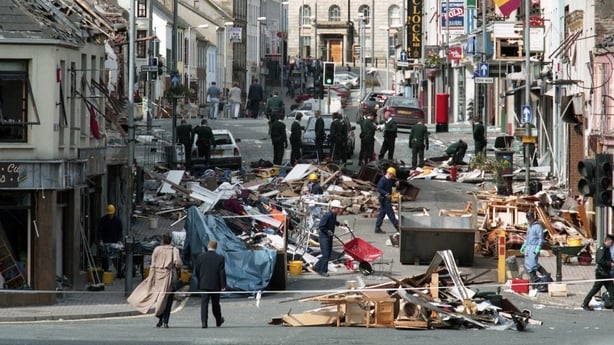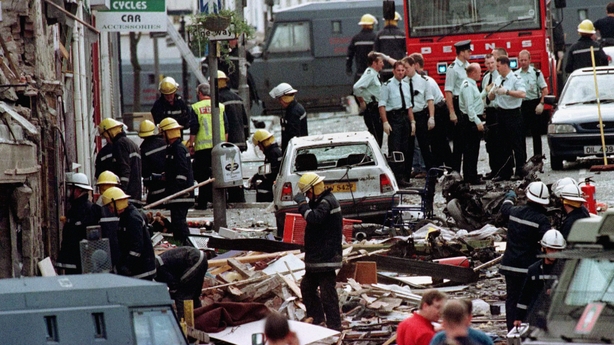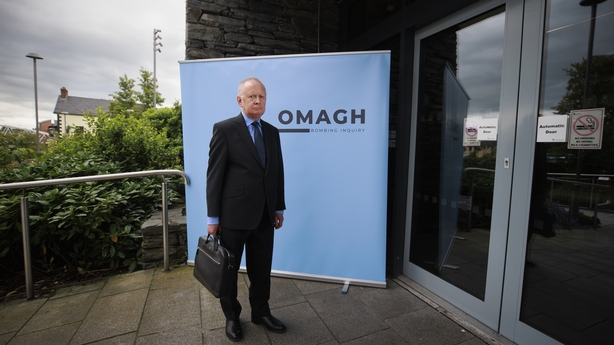A day of reckoning is fast approaching for the Irish Government and its engagement with the Omagh bomb inquiry.
There have been many positive words.
Taoiseach Micheál Martin and Tánaiste Simon Harris have both given emphatic and repeated promises of cooperation, assuring families of the 29 people killed that the Irish authorities will not be found wanting.
The time for talking is now over and it will soon be time for action.
The first two weeks of the British government's inquiry into the 1998 atrocity have been set aside for the families of those who were murdered on a sunny Saturday afternoon on 15 August 1998.
The inquiry chairman Alan Turnball said it was important for the inquiry to hear about those lost lives, the people behind the statistics.
The first three days of commemorative hearings were at times deeply distressing.
Read more: Absence of parallel Omagh inquiry a loss, says Flanagan
There were heartrending accounts of the impact of the deaths on those left behind.
Family members spoke of hopes and dreams being destroyed as well as lives.
On Tuesday, the first day of hearings in the Strule Arts Centre in Omagh, the Tánaiste was 120km away at Stormont for meetings with the First and deputy First Ministers Michelle O'Neill and Emma Little-Pengelly as well as other politicians.

Speaking to the media afterwards, Simon Harris said he wanted to give a "categoric" assurance that there would be "full co-operation."
"Our absolute, overstated clear aim here is to make sure that all questions are answered through this inquiry," he added.
"I want to assure all of the families that the Irish Government will co-operate."
Mr Harris pointed out that the commitment is "explicitly clear" in the Programme for Government.
That commitment is set out on page 143 under the heading Legacy and Promoting Reconciliation.
It states that the Government will "play our full part in legacy processes and address the legacy of the conflict in this jurisdiction, including facilitating and supporting the Omagh inquiry."
The Taoiseach last week also repeated a pledge that the government will co-operate fully.
The question is, what does that mean?
The commitment will soon be put to the test as evidentiary hearings, involving the questioning of police and intelligence agencies, are due to begin before the summer and these hearings could potentially span several months.
Critics have raised concerns that the Irish authorities will draw a line on the extent of co-operation for reasons of "sovereignty".
Is it really conceivable that members of the Irish intelligence community will be authorised to engage in full cooperation?
One senior Irish Department of Justice source with knowledge of the issue told RTÉ News they do not believe the government will sign off on unfettered access.

"I cannot see them doing it, I think they will draw a line on how far co-operation can go," they said.
"I suspect they will draw a line that can't be crossed."
Such an approach would create huge problems for the inquiry.
While the explosion took place in Northern Ireland, the planning and construction of the device as well as its delivery to Market Street in Omagh were all orchestrated from the South.
Unlike the bombers, the remit of Alan Turnball’s inquiry stops at the border.
That means crucial parts of the jigsaw will be missing unless the Irish authorities agree to make all of the pieces available.
Former Minister for Justice and Minister for Foreign Affairs Charlie Flanagan has expressed concern that the Irish government will not co-operate fully.
"I am concerned that the Irish state will overuse national security, that they will use national security issues too liberally," he told RTE News.
He is concerned that the absence of a parallel statutory inquiry in the Republic means former Irish intelligence or police officers with important information can decide not to co-operate and cannot be compelled to do so.
"Under the current UK terms of reference, while the Irish Government says it will not be found wanting, my concern is that we will not be able to square that circle on compellability and that vital evidence may not be forthcoming," he said.
The chair of the UK inquiry will not be able to set out in detail what level of co-operation and engagement he is receiving from the Irish authorities while the inquiry remains active.
However, the families will expect some commentary as to whether he is satisfied with the extent.
Michael Gallagher, whose son Aiden was one of those killed in the Omagh bombing, was one of the driving forces behind the long campaign by families for a public inquiry and has warned the families will mount legal action if the repeated promises of full co-operation are not fulfilled.
The problem for the families is that they will not know the extent, or lack, of co-operation.

The questioning of police and military intelligence officers will take place behind closed doors, without family or media access.
The Irish government has been hugely critical of the British Government over its approach to the legacy of Northern Ireland’s Troubles.
It has loudly and repeatedly accused the UK of ignoring the views of the victims and has taken the unusual step of mounting an inter-state case against the British government on the issue of legacy in the European Court of Human Rights.
Critics will loudly shout "hypocrites" if Ireland fails to deliver the very openness and transparency on legacy it has so publicly demanded of the UK.
It may only be at the end of the inquiry process when Alan Turnball produces his findings that he will provide a definitive assessment of the extent of Irish government co-operation, or lack of it.
That will be the day of reckoning, when actions will be judged against all the positive words.







